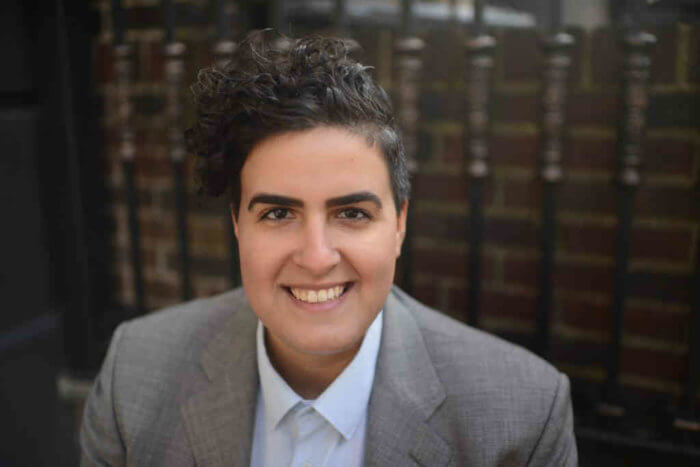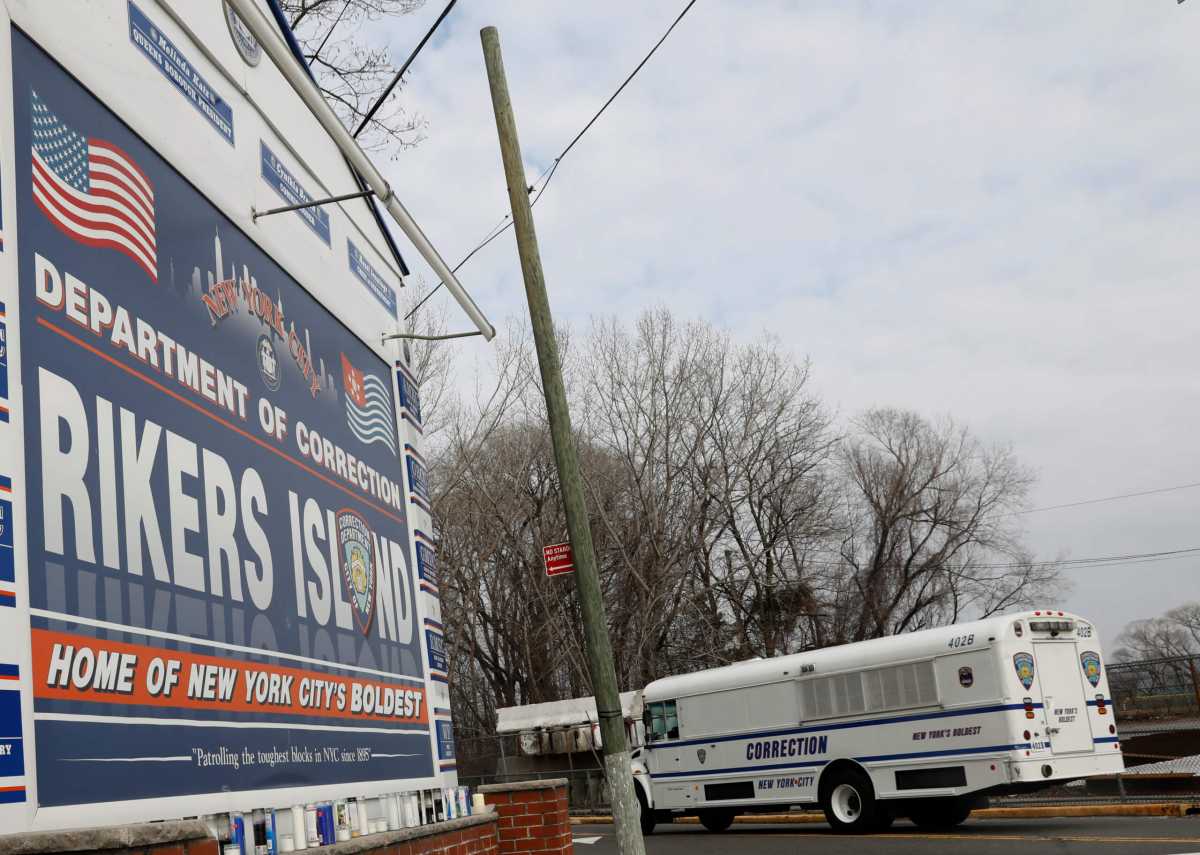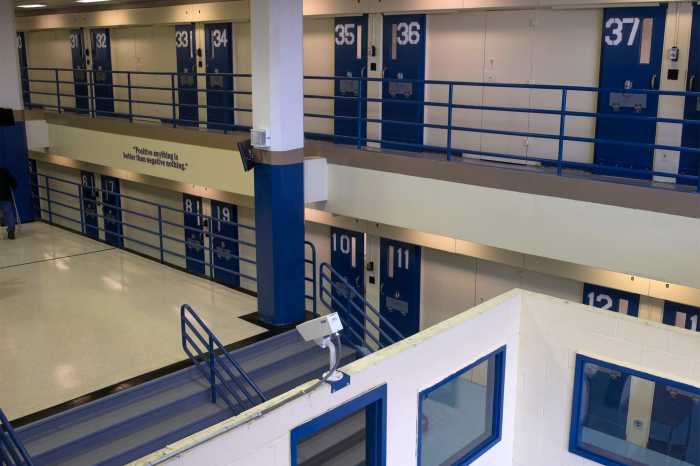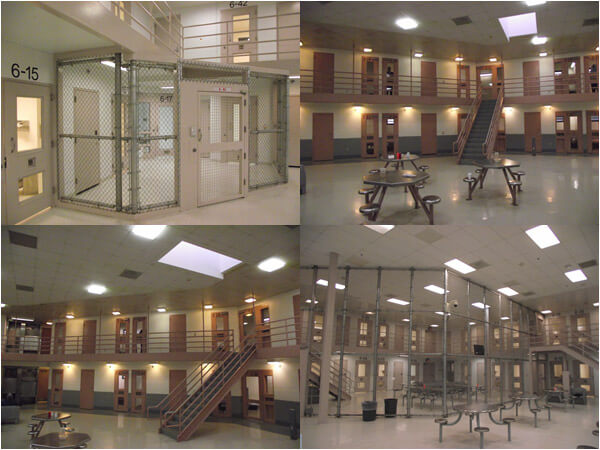Local leaders and attorneys representing trans clients are expressing reservations in response to a plan to transfer hundreds of people — including cisgender and transgender women, as well as trans men and non-binary individuals — from Rikers to state-run facilities upstate.
The plan was unveiled in a joint announcement between the de Blasio and Hochul administrations on October 13, but attorney Deborah Lolai, who heads up the LGBTQ Defense Project at Bronx Defenders and serves on a city task force to address problems facing transgender, gender non-conforming, non-binary, and intersex people in city custody, said the announcement came out of the blue and raised questions about the status of health services, attorney visitation rights, and other needs for detainees — even as government officials say services will continue upstate.
“Everyone on the task force except for those at the Department of Correction (DOC) were completely blindsided by this,” said Lolai, who represents trans clients at Rikers. Lolai spoke to Gay City News October 15 from the parking lot at the Rose M. Singer Center (RMSC), which houses the soon-to-be-transferred individuals.
The Hochul administration insisted on October 13 that the “temporary transfer will help ease staffing concerns, capacity constraints, and improve safety for many until the city can implement a permanent solution” at the notorious Rikers jail complex. The state intends to move 230 people from the Rose M. Singer Center to the Bedford Hills Correctional Facility and the Taconic Correctional Facility beginning on October 18. Detainees will be transferred twice per week, with 10 to 20 people moving at a given time. Those who have pending immigration cases will not be moved.
A Hochul administration spokesperson clarified to Gay City News that the individuals who will be transferred includes trans women, trans men, and individuals identifying as gender non-conforming or non-binary. Lolai, however, said numerous transgender women continue to be housed in the men’s jail at Rikers, which will not be included in the forthcoming transfers.
“While the conditions at Rikers Island are human rights violations, the worst of it — the facilities that have been getting the media’s attention because of their inhumane conditions — are the men’s facilities, not the women’s jail, RMSC,” Lolai said. Hochul’s office said 143 men incarcerated at Rikers have already been transferred to state facilities.

The plan follows numerous reports of disastrous conditions at Rikers, where a dozen detainees have died so far this year — including an out gay man, Esias “Izzy” Johnson, whose family told Gay City News he was screaming out for medical attention in the time leading up to his death last month. One of the most high-profile deaths at Rikers came in 2019 when Layleen Polanco, an Afro-Latinx transgender woman, died in her restrictive housing cell of seizures caused by epilepsy. Polanco’s case led to more than a dozen suspensions and a $5.9 million settlement. The DOC has also suspended multiple officers in response to Johnson’s death while that case continues to be investigated.
Elisa Crespo, the executive director of the New Pride Agenda, a statewide LGBTQ advocacy group, said she does not see how the transfers will translate into positive change.
“We understand the governor is trying to do all she can to deal with the crisis at Rikers, but moving folks from one jail to another just doesn’t seem like a solution,” Crespo told Gay City News. “The goal is decarceration. Folks who are in pre-trial detention should be released while they go through the courts. Moreover, we’re very concerned about the lack of trans-inclusive jail policies in state facilities.”
Several out LGBTQ elected officials have visited the Rikers jail as of late, including Bronx Congressmember Ritchie Torres, who toured the jail on October 12 with fellow New York Congressmembers Alexandria Ocasio-Cortez and Carolyn Maloney. Torres is welcoming the plan to transfer detainees upstate.
“Thank you @GovKathyHochul for partnering with @NYCMayor in responsibly reducing the population at Rikers Island and alleviating the staffing crisis that has taken hold there,” Torres wrote on Twitter after Hochul’s announcement. “Progress.”
Assemblymember Jessica González-Rojas of Queens has also visited Rikers, where she said a man living with HIV was not receiving his medication and a trans woman was not being housed in accordance with her gender identity.
“I appreciate that Governor Hochul recognizes Rikers Island is a death trap for women and trans people,” González-Rojas said in a written statement to Gay City News following Hochul’s announcement. “She’s certainly being creative in the face of inaction by judges and our district attorney in Queens. At the same time, temporary fixes are not decarceration. We have done the tweaks and they don’t work.”
González-Rojas is urging her colleagues in the State Legislature to pass a series of bills aimed at alleviating conditions for incarcerated individuals, including Elder Parole, Fair and Timely Parole, and the Clean Slate Act, which would seal criminal records. She is also calling on district attorneys in the city to stop asking for cash bail, which, she says, “only criminalizes people in poverty.”
And yet, even as conditions at Rikers appear to have hit rock bottom, Lolai said the transfers are moving ahead at a time when the DOC is just starting to make progress in its treatment of queer detainees under the director of LGBTQ initiatives, Elizabeth Munsky, who entered that role in 2019. Munsky has overseen an expansion of programming for detainees and the DOC has added a handful of LGBTQ coordinators to meet with trans detainees more consistently, Lolai said. She cannot say the same thing about state prisons, which she said are not designed to take people who are in jail pre-trial while they fight their cases.
“I can go into the Department of Correction and visit clients most hours of the day,” Lolai said. “At state prison, I would only get one 30-minute phone call with my clients per month.”
Other attorneys representing trans clients are also pushing back against the plan. The Legal Aid Society believes the decision “will create new harms” and cause disruptions to families, support networks, and due process. Tina Luongo, attorney-in-charge of the Criminal Defense Practice at the Legal Aid Society, is concerned that trans and non-binary clients will lose access to resources or end up in the wrong housing.
“It throws into chaos a carefully calibrated web of services which ensures that women are prepared for reentry back into society upon release,” Luongo said in a written statement. “These New Yorkers, who are being detained pre-trial, will be moved to state prisons that are not equipped to hold people defending criminal charges, and that do not comport with New York City Board of Correction standards.”
Lolai said she had already heard from multiple trans clients who expressed their opposition to the upcoming transfers.
“They understand it’s going to be much more complicated for them to get support for court appearances,” Lolai said. “They understand that they are going to be removed from the community already than they are removed — and that scares a lot of people.”
To sign up for the Gay City News email newsletter, visit gaycitynews.com/newsletter
































